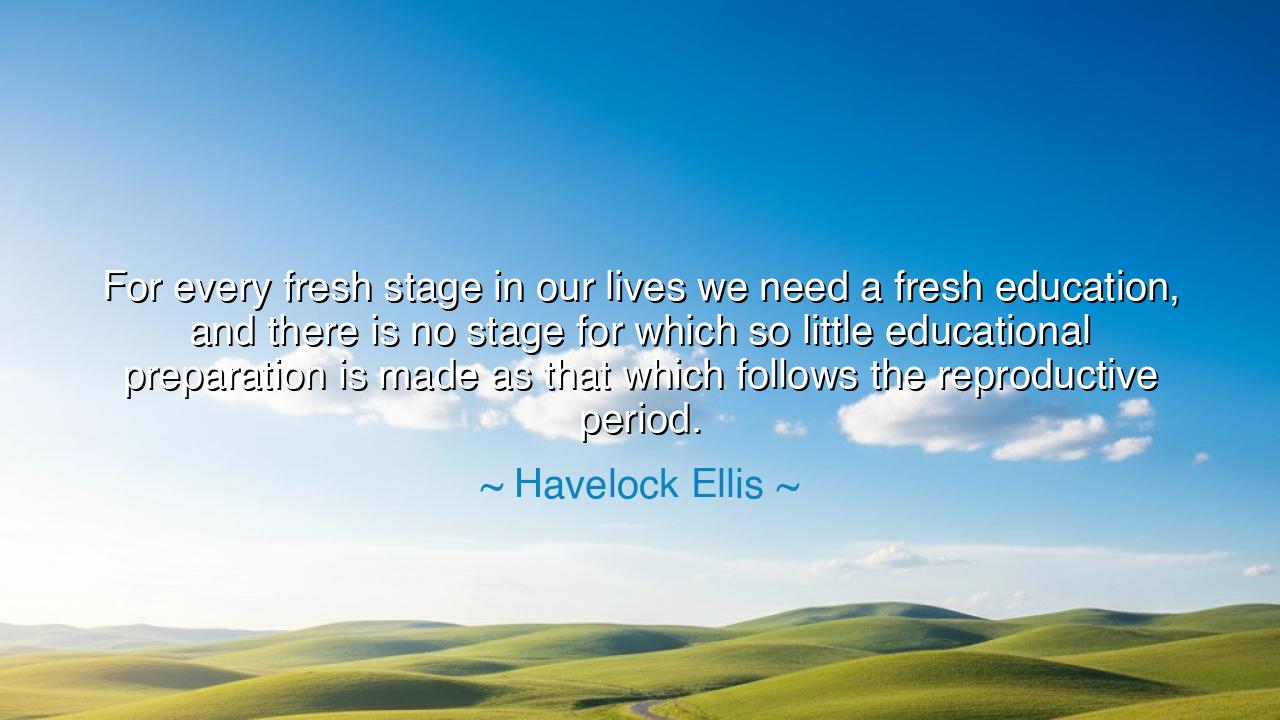
For every fresh stage in our lives we need a fresh education, and
For every fresh stage in our lives we need a fresh education, and there is no stage for which so little educational preparation is made as that which follows the reproductive period.






Havelock Ellis, the physician and thinker who sought to understand the hidden rhythms of human life, once proclaimed: “For every fresh stage in our lives we need a fresh education, and there is no stage for which so little educational preparation is made as that which follows the reproductive period.” These words, though spoken in a modern tongue, bear the ring of timeless wisdom. They remind us that life is not a single climb to a single summit, but a series of peaks and valleys, each demanding its own knowledge, each requiring its own renewal of the spirit.
The meaning of his teaching is this: we are schooled in childhood, trained for work, guided in the making of families. But when the fires of youth begin to wane, when children grow and leave, when the body slows and the hair turns silver—society too often falls silent. No education is offered for this stage, no guidance given for the art of aging, the dignity of wisdom, or the peace of endings. Ellis saw in this a great neglect: that humanity prepares its young for beginnings but abandons its elders at the threshold of completion.
The ancients, however, did not forget this final stage. In Greece, the elders sat in council, their voices carrying the weight of long memory. In many African traditions, the griot or elder was the living library of the tribe, guiding the young with tales of the past. In China, Confucius himself taught that reverence for the aged was the foundation of a just society. These cultures understood what Ellis sought to remind us: that later life is not a wasteland, but a harvest, and it too requires education—not of books, but of the soul, the heart, and the art of living fully in the twilight.
History gives us poignant examples. Consider Michelangelo, who in his eighties carved the Rondanini Pietà, a work filled not with youthful vigor but with haunting serenity, shaped by a lifetime of suffering and faith. He was not the same man who painted the ceiling of the Sistine Chapel. He was in a new stage, and he needed a new education—the education of loss, of reflection, of preparing for eternity. His work in age reveals that greatness does not cease with youth; it transforms. But how few are prepared to find meaning in this transformation!
Ellis’s words also strike us as a challenge. Too often, the modern world casts aside the elderly, treating them as burdens rather than wells of wisdom. We build schools for the young, but few sanctuaries for the aged to continue learning, growing, and teaching. We prepare men and women for careers, but not for the dignity of retirement; for parenting, but not for the silence when children depart; for ambition, but not for reflection. Thus, the later stages of life are left unlit, when they should glow brightest with meaning.
The lesson is plain: seek education not only for the early path, but for the whole journey. When you are young, prepare for work; when grown, prepare for love and service; but when the later years come, prepare for wisdom, for giving back, for making peace with the self. Each stage must be entered with new learning, lest the soul stagnate. To deny this is to rob life of its fullness, for the last chapters are as sacred as the first.
So what must you do? Begin now to honor every stage of life. If you are young, seek the counsel of elders, and learn from them how to age with dignity. If you are in the fullness of your years, prepare your heart for the transformations to come, not with fear but with curiosity. If you are old, do not cease to learn; take up books, crafts, stories, friendships—let your later years be a school of wisdom and joy. For life is not one education but many, and each stage is a classroom in which the soul is tested and refined.
Thus, remember Havelock Ellis’s words: “For every fresh stage in our lives we need a fresh education …” Carry them as a law of existence. For youth, maturity, and age are not rivals, but companions on the same path. And only when we prepare for each stage with humility and courage shall we live not half a life, but a life complete.






AAdministratorAdministrator
Welcome, honored guests. Please leave a comment, we will respond soon